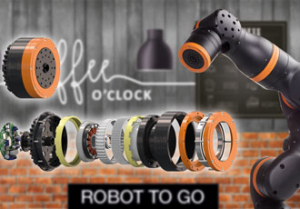Advances in classical technologies assure the machine tool’s future

For the first time at this year’s EMO Hannover, a research symposium will be held; under its aegis, the latest scientific developments will be presented. The VDW (German Machine Tool Builders’ Association) is in conjunction with the WGP (German Academic Society for Production Engineering) organising the ‘Production for Tomorrow’ symposium. It will be focusing less on digitalisation and Industry 4.0 than on the numerous innovations in the fields of classical technologies.
“With this symposium, we are aiming quite deliberately to draw attention to precisely those innovations that will guarantee the high-end quality of machine tools for the years ahead as well, irrespective of network thinking,” emphasised Prof. Eberhard Abele, President of the WGP – a grouping of leading German mechanical engineering professors.
Good reputation of German machines thanks to classical technologies
On September 21st 2017, at the EMO Hannover, the Production for Tomorrow symposium will be taking a look at the future of production. This has changed considerably over recent years, a development substantially attributable to digitalisation and networking of machines and lines within the context of Industry 4.0.
But the classical technologies, too, possess immense inherent potentials, as the numerous remarkable developments of recent years go to show. “For example: in terms of metrology, drive technology and also laser beam sources, the quality of machine tools is steadily rising,” reported Professor Abele. “So classical technologies will guarantee the reputation of German machines in regard to precision, availability, efficiency and productivity into the future as well.”
A window on Production 2025
Therefore the symposium begins logically enough with a keynote presentation from Professor Abele, who heads the Institute for Production Management, Technology and Machine Tools (PTW) at Darmstadt University of Applied Science. He will be outlining the production technology of 2025 from the WGP’s viewpoint. Representatives of seven prestigious WGP institutes will then report on their results from government-sponsored research projects focusing primarily on machine design and ultra-efficient manufacturing technologies.
Researchers from Hanover, for example, will be showing how in future production operations can be design-enhanced by means of active mechatronic systems. The limitations of metal-cutting processes, for example, lie not least in unwanted vibrations of the machines, known as machine dynamics and process dynamics. The researchers in Hanover have developed active intelligent systems that extend the previous technical limitations of axis and process dynamics.
Another presentation is devoted to the PLC program codes for machine tools. The control software has hitherto been tested manually by staff at virtual commissioning of the machines. Scientists in Stuttgart have now developed a system for automating this test. This renders it both more reliable and also more time-efficient, since a far higher proportion of the code can be tested in the same period.
Researchers from Kaiserslautern addressed the issue of drilling tools. Since drilling is one of the most frequent cutting processes, it offers concomitantly high potential for optimisation in regard to cost-efficiency and quality. These approaches to improvement have focused on the cooling lubricant feed and the cutting behaviour. Under the aegis of the symposium, the researchers will be presenting their innovative solutions in these two fields. Moreover, they will be showing simulation processes designed to improve the position and contour of the outlet nozzle at the internal cooling lubricant feed, so as to enable the efficiency of the cooling function and the high-precision, flexible preparation of the cutting edges to be optimised.
Not the least of the topics being addressed by Production for Tomorrow is ultra-high-precision machining – an extremely versatile technology for producing high-precision parts and optical surfaces. Its disadvantage, however, lies in the lengthy machining and make-ready times, which can easily last for several hours or even days.
Scientists from Bremen and Hanover will be presenting some astounding results on high-performance metal-cutting. They have the potential to shorten the machining time for ultra-high-precision parts in the near future by a factor of 10. In addition to the time gained, advantages are also created in regard to cutting forces and wear and tear on the diamond tool.
High-performance diamond milling, moreover, takes up a lot of time for manual spindle balancing. Here, the researchers from Hanover and Bremen will be presenting new approaches for more accurate, automated adjustment of the spindles. Last but not least, they will also be unveiling an innovative thermo-mechanical system for tool alignment in diamond milling applications.
The multifaceted research results detailed by the speakers during the Production for Tomorrow symposium will not only offer visitors insights into the production operations of the future: after the presentations there will be enough time for mutual empirical feedback with international experts.
Similar articles
More from VDW - German Machine Tool Builders` Association
- It’s cutting-edge technology, so what do you know about Industry 4.0? 9th January 2018
- Machine tool orders remain stable in Germany 7th August 2017
- Advances in classical technologies assure the machine tool’s future 1st August 2017
- Market opportunities in Malaysian industrial sector 25th July 2017












Write a comment
No comments